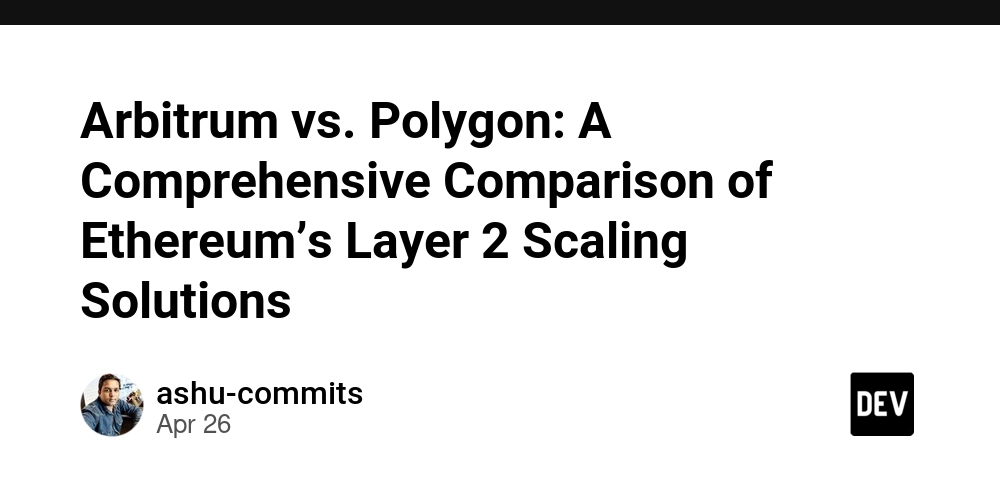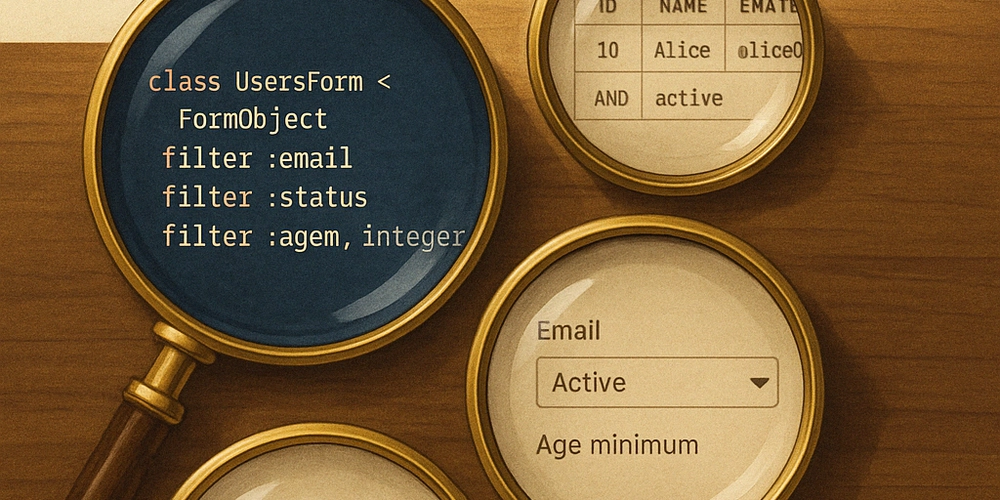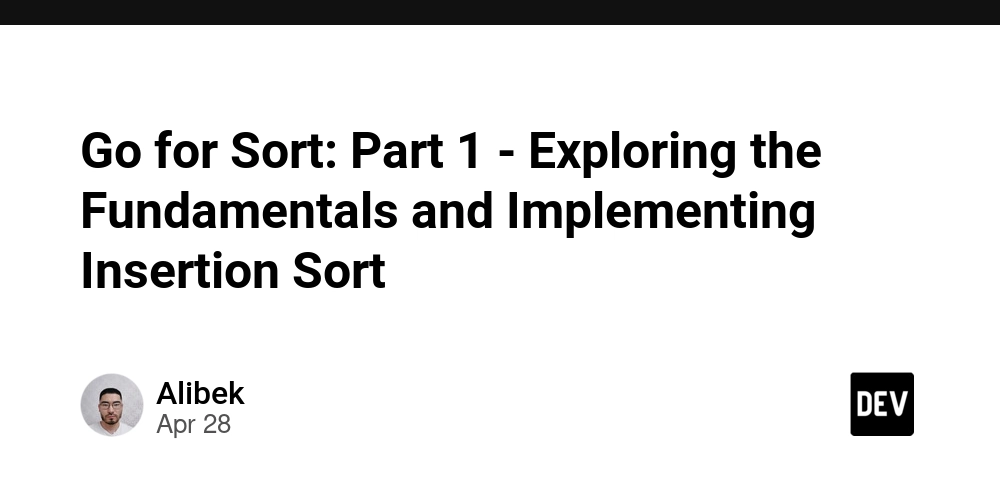3 Powerful Ways to Write Shorter, Cleaner, and Better Code
In today's fast-paced development world, writing shorter, cleaner, and better code isn’t just a best practice — it's a necessity. Clean code is easier to debug, maintain, extend, and hand over to new team members. It leads to faster project delivery, fewer bugs, and ultimately better products. Over the years working across web and mobile development projects, I’ve noticed that a few simple principles consistently make the biggest difference. Here are three powerful ways you can immediately start writing shorter, cleaner, and better code: 1. Master the Art of Meaningful Naming One of the easiest ways to make your code cleaner — without changing any logic — is by improving your naming conventions. Bad Example: function c(a, b) { return a + b; } function calculateTotal(price, tax) { return price + tax; } Why it matters: Clear names remove the need for extra comments or documentation. A new developer (or even future you) can instantly understand what a function or variable does without guessing. Tips for meaningful naming: Name functions like actions (calculateTotal, fetchUserData). Name variables like objects (user, invoiceAmount, sessionToken). Avoid generic names like data, info, or temp. 2. Apply the DRY Principle ("Don't Repeat Yourself") One major cause of messy, bloated code is duplication. If you find yourself copy-pasting blocks of code, it’s time to refactor. Bad Example: def get_user_email(user): if user == 'admin': return 'admin@example.com' elif user == 'manager': return 'manager@example.com' elif user == 'developer': return 'developer@example.com' # Somewhere else in code: def get_user_role(user): if user == 'admin': return 'Administrator' elif user == 'manager': return 'Manager' elif user == 'developer': return 'Developer' USER_DATA = { 'admin': {'email': 'admin@example.com', 'role': 'Administrator'}, 'manager': {'email': 'manager@example.com', 'role': 'Manager'}, 'developer': {'email': 'developer@example.com', 'role': 'Developer'} } def get_user_info(user): return USER_DATA.get(user) Why it matters: The DRY principle reduces redundancy, making your code shorter, easier to update, and less prone to bugs. If a user’s data changes, you only have to update it once instead of hunting through your entire codebase. Quick ways to apply DRY: Extract repeated logic into functions or modules. Use data structures (like arrays, objects, or dictionaries) instead of repetitive conditions. Write reusable components (especially important in frontend frameworks like React or Vue). 3. Leverage Built-in Language Features and Libraries Instead of reinventing the wheel, always look into whether the language or its ecosystem already provides a cleaner solution. Example (JavaScript): Bad Way: let numbers = [1, 2, 3, 4, 5]; let doubled = []; for (let i = 0; i < numbers.length; i++) { doubled.push(numbers[i] * 2); } let numbers = [1, 2, 3, 4, 5]; let doubled = numbers.map(num => num * 2); Why it matters: Modern languages are packed with powerful tools that can perform complex tasks with a single line of code — while keeping it highly readable. The .map(), .filter(), .reduce(), and .forEach() methods, for instance, make array handling cleaner and more expressive. Pro Tip: Before writing complex manual logic, Google "how to do [X] in [language]". You'll often find a built-in method, library, or package that does exactly what you need — faster and better. Final Thoughts Writing shorter, cleaner, and better code isn't about cramming everything into one-liners or using obscure tricks. It’s about clarity, efficiency, and maintainability. By mastering meaningful naming, applying the DRY principle, and leveraging built-in features, you’ll transform not only the quality of your code but also your entire development workflow. Remember: "Any fool can write code that a computer can understand. Good programmers write code that humans can understand." – Martin Fowler Need help making your team's codebase cleaner and more scalable? Let’s connect — Nubiz Solutions offer consultations and codebase audits to bring the best out of your projects!
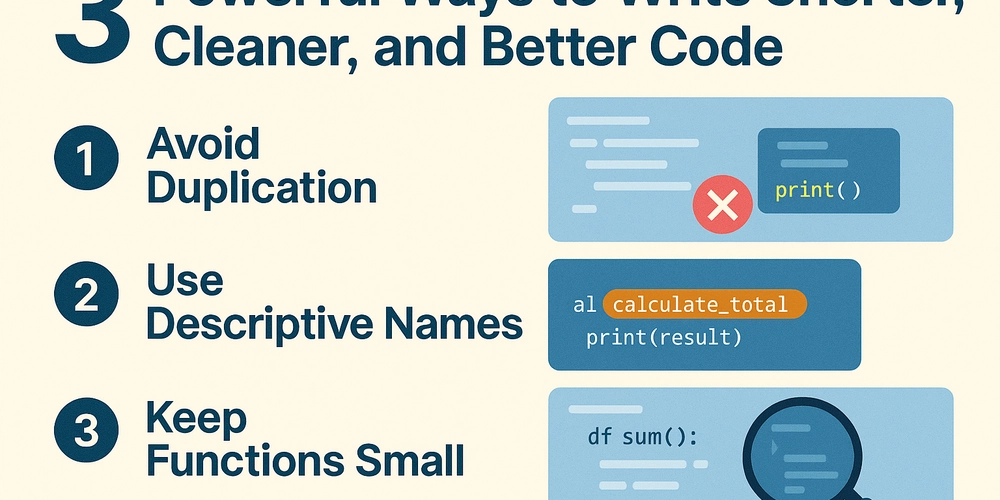
In today's fast-paced development world, writing shorter, cleaner, and better code isn’t just a best practice — it's a necessity. Clean code is easier to debug, maintain, extend, and hand over to new team members. It leads to faster project delivery, fewer bugs, and ultimately better products.
Over the years working across web and mobile development projects, I’ve noticed that a few simple principles consistently make the biggest difference. Here are three powerful ways you can immediately start writing shorter, cleaner, and better code:
1. Master the Art of Meaningful Naming
One of the easiest ways to make your code cleaner — without changing any logic — is by improving your naming conventions.
Bad Example:
function c(a, b) {
return a + b;
}
function calculateTotal(price, tax) {
return price + tax;
}
Why it matters:
Clear names remove the need for extra comments or documentation. A new developer (or even future you) can instantly understand what a function or variable does without guessing.
Tips for meaningful naming:
Name functions like actions (calculateTotal, fetchUserData).
Name variables like objects (user, invoiceAmount, sessionToken).
Avoid generic names like data, info, or temp.
2. Apply the DRY Principle ("Don't Repeat Yourself")
One major cause of messy, bloated code is duplication. If you find yourself copy-pasting blocks of code, it’s time to refactor.
Bad Example:
def get_user_email(user):
if user == 'admin':
return 'admin@example.com'
elif user == 'manager':
return 'manager@example.com'
elif user == 'developer':
return 'developer@example.com'
# Somewhere else in code:
def get_user_role(user):
if user == 'admin':
return 'Administrator'
elif user == 'manager':
return 'Manager'
elif user == 'developer':
return 'Developer'
USER_DATA = {
'admin': {'email': 'admin@example.com', 'role': 'Administrator'},
'manager': {'email': 'manager@example.com', 'role': 'Manager'},
'developer': {'email': 'developer@example.com', 'role': 'Developer'}
}
def get_user_info(user):
return USER_DATA.get(user)
Why it matters:
The DRY principle reduces redundancy, making your code shorter, easier to update, and less prone to bugs. If a user’s data changes, you only have to update it once instead of hunting through your entire codebase.
Quick ways to apply DRY:
Extract repeated logic into functions or modules.
Use data structures (like arrays, objects, or dictionaries) instead of repetitive conditions.
Write reusable components (especially important in frontend frameworks like React or Vue).
3. Leverage Built-in Language Features and Libraries
Instead of reinventing the wheel, always look into whether the language or its ecosystem already provides a cleaner solution.
Example (JavaScript):
Bad Way:
let numbers = [1, 2, 3, 4, 5];
let doubled = [];
for (let i = 0; i < numbers.length; i++) {
doubled.push(numbers[i] * 2);
}
let numbers = [1, 2, 3, 4, 5];
let doubled = numbers.map(num => num * 2);
Why it matters:
Modern languages are packed with powerful tools that can perform complex tasks with a single line of code — while keeping it highly readable. The .map(), .filter(), .reduce(), and .forEach() methods, for instance, make array handling cleaner and more expressive.
Pro Tip:
Before writing complex manual logic, Google "how to do [X] in [language]". You'll often find a built-in method, library, or package that does exactly what you need — faster and better.
Final Thoughts
Writing shorter, cleaner, and better code isn't about cramming everything into one-liners or using obscure tricks. It’s about clarity, efficiency, and maintainability. By mastering meaningful naming, applying the DRY principle, and leveraging built-in features, you’ll transform not only the quality of your code but also your entire development workflow.
Remember:
"Any fool can write code that a computer can understand. Good programmers write code that humans can understand." – Martin Fowler
Need help making your team's codebase cleaner and more scalable?
Let’s connect — Nubiz Solutions offer consultations and codebase audits to bring the best out of your projects!


.jpg)





























































































































































![[The AI Show Episode 143]: ChatGPT Revenue Surge, New AGI Timelines, Amazon’s AI Agent, Claude for Education, Model Context Protocol & LLMs Pass the Turing Test](https://www.marketingaiinstitute.com/hubfs/ep%20143%20cover.png)































































































































































































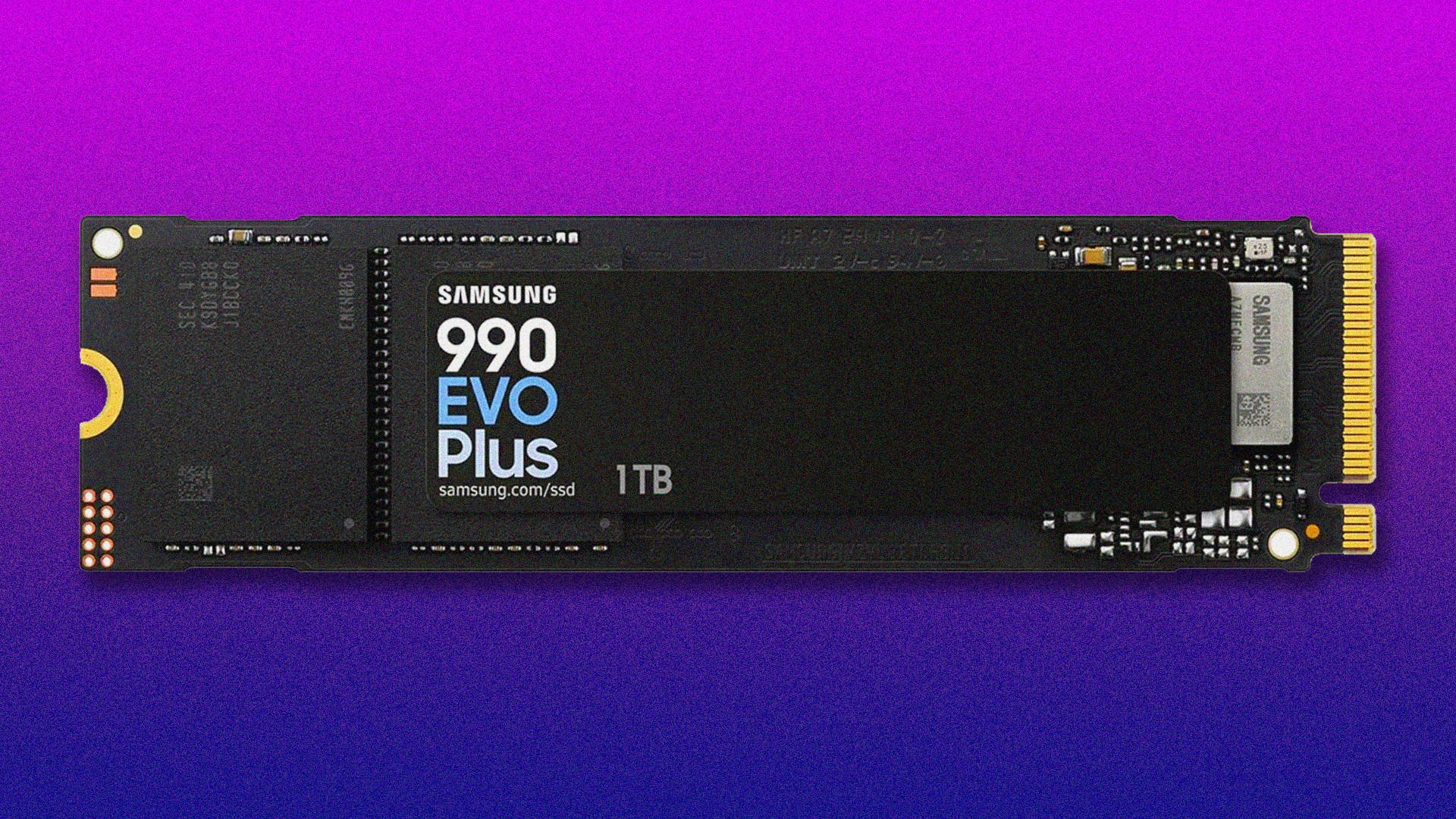

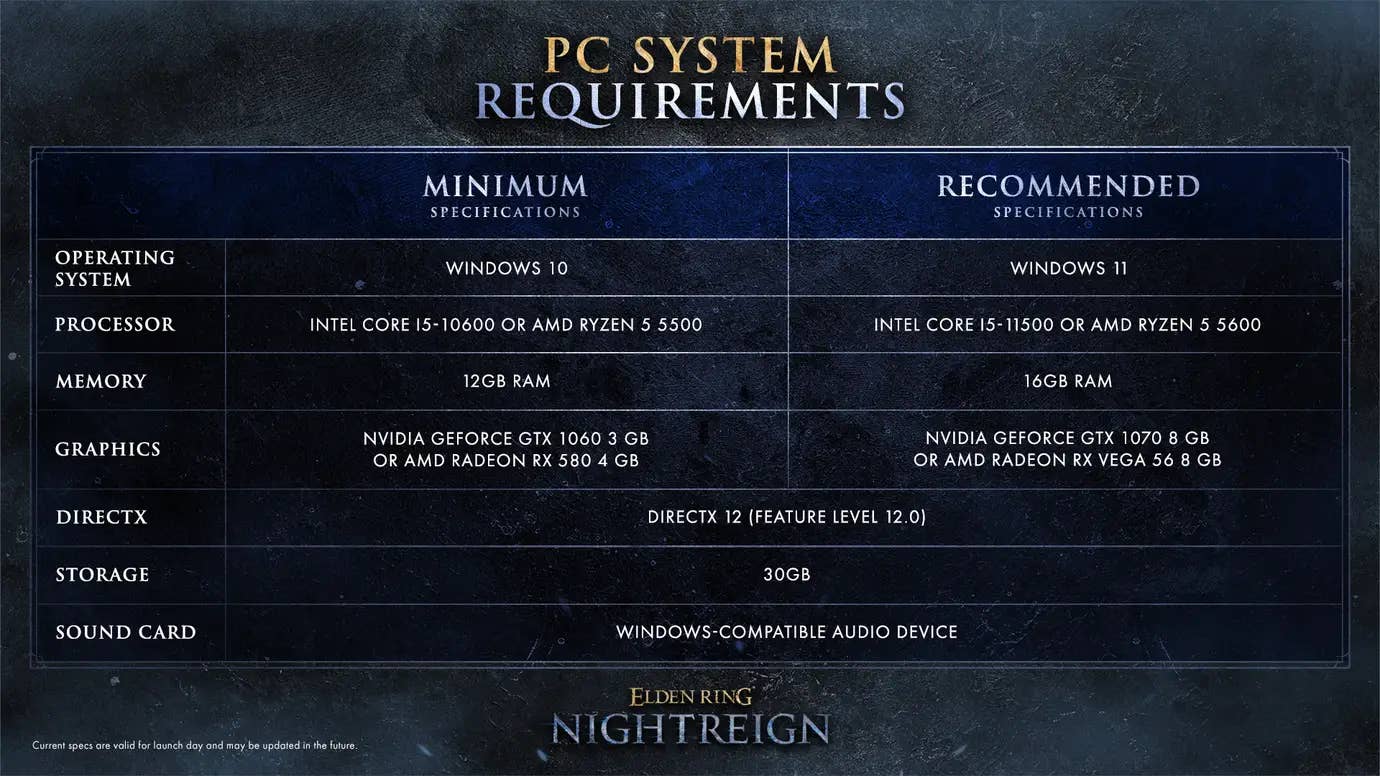











































































_Muhammad_R._Fakhrurrozi_Alamy.jpg?width=1280&auto=webp&quality=80&disable=upscale#)





























































































![macOS 15.5 beta 4 now available for download [U]](https://i0.wp.com/9to5mac.com/wp-content/uploads/sites/6/2025/04/macOS-Sequoia-15.5-b4.jpg?resize=1200%2C628&quality=82&strip=all&ssl=1)
















![AirPods Pro 2 With USB-C Back On Sale for Just $169! [Deal]](https://www.iclarified.com/images/news/96315/96315/96315-640.jpg)
![Apple Releases iOS 18.5 Beta 4 and iPadOS 18.5 Beta 4 [Download]](https://www.iclarified.com/images/news/97145/97145/97145-640.jpg)
![Apple Seeds watchOS 11.5 Beta 4 to Developers [Download]](https://www.iclarified.com/images/news/97147/97147/97147-640.jpg)
![Apple Seeds visionOS 2.5 Beta 4 to Developers [Download]](https://www.iclarified.com/images/news/97150/97150/97150-640.jpg)















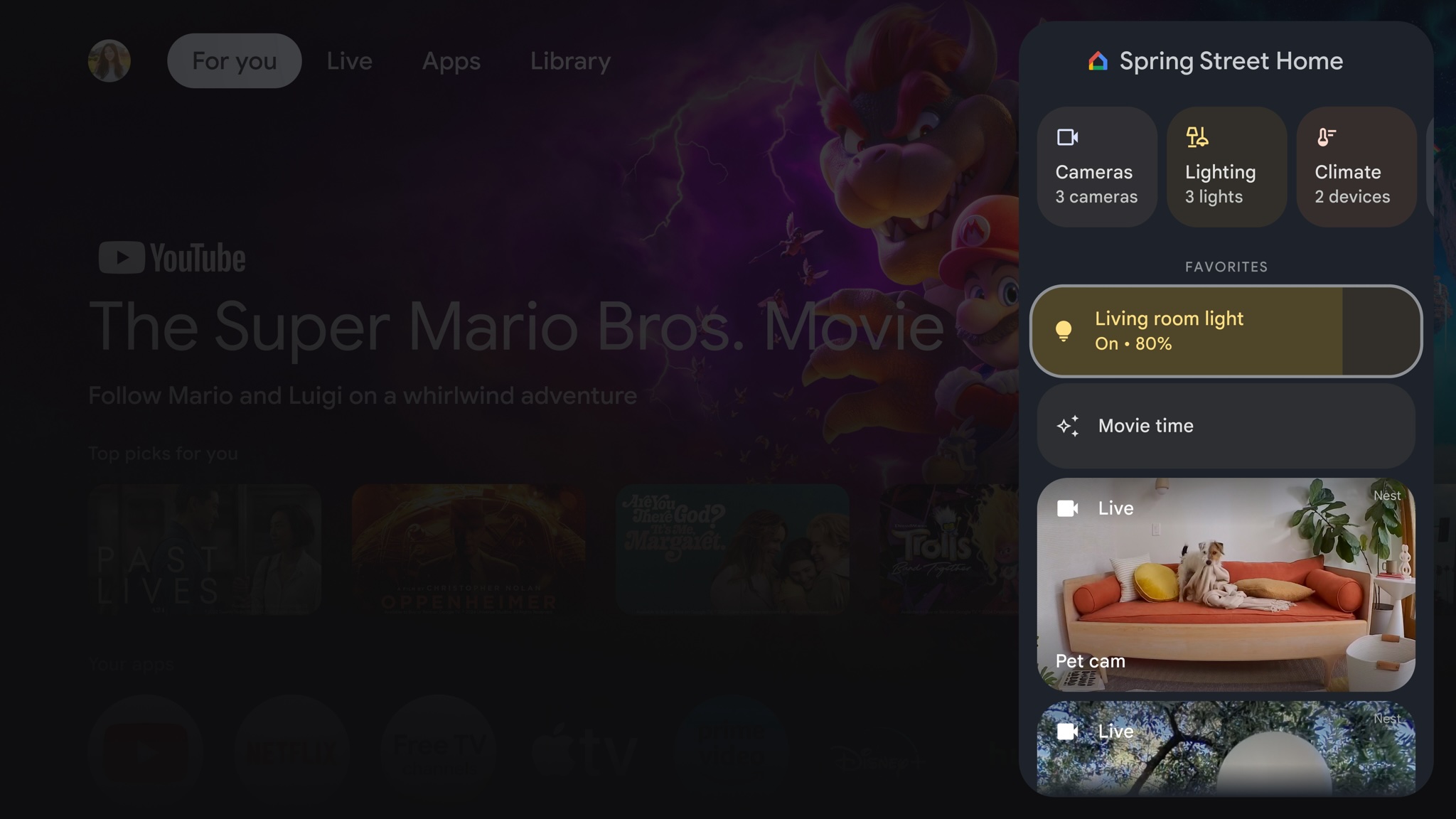





















![Apple Seeds Fourth Beta of iOS 18.5 to Developers [Update: Public Beta Available]](https://images.macrumors.com/t/uSxxRefnKz3z3MK1y_CnFxSg8Ak=/2500x/article-new/2025/04/iOS-18.5-Feature-Real-Mock.jpg)
![Apple Seeds Fourth Beta of macOS Sequoia 15.5 [Update: Public Beta Available]](https://images.macrumors.com/t/ne62qbjm_V5f4GG9UND3WyOAxE8=/2500x/article-new/2024/08/macOS-Sequoia-Night-Feature.jpg)





















































